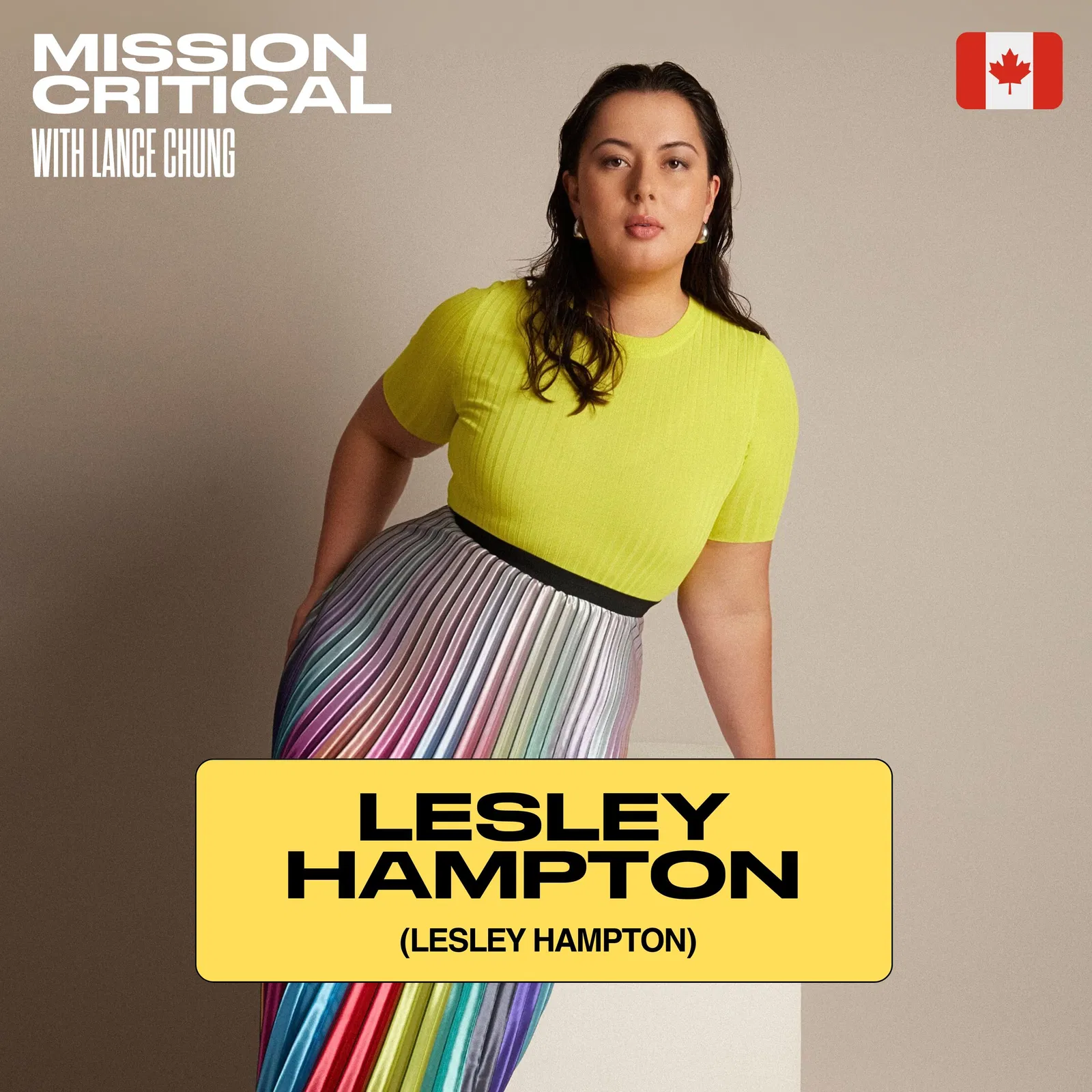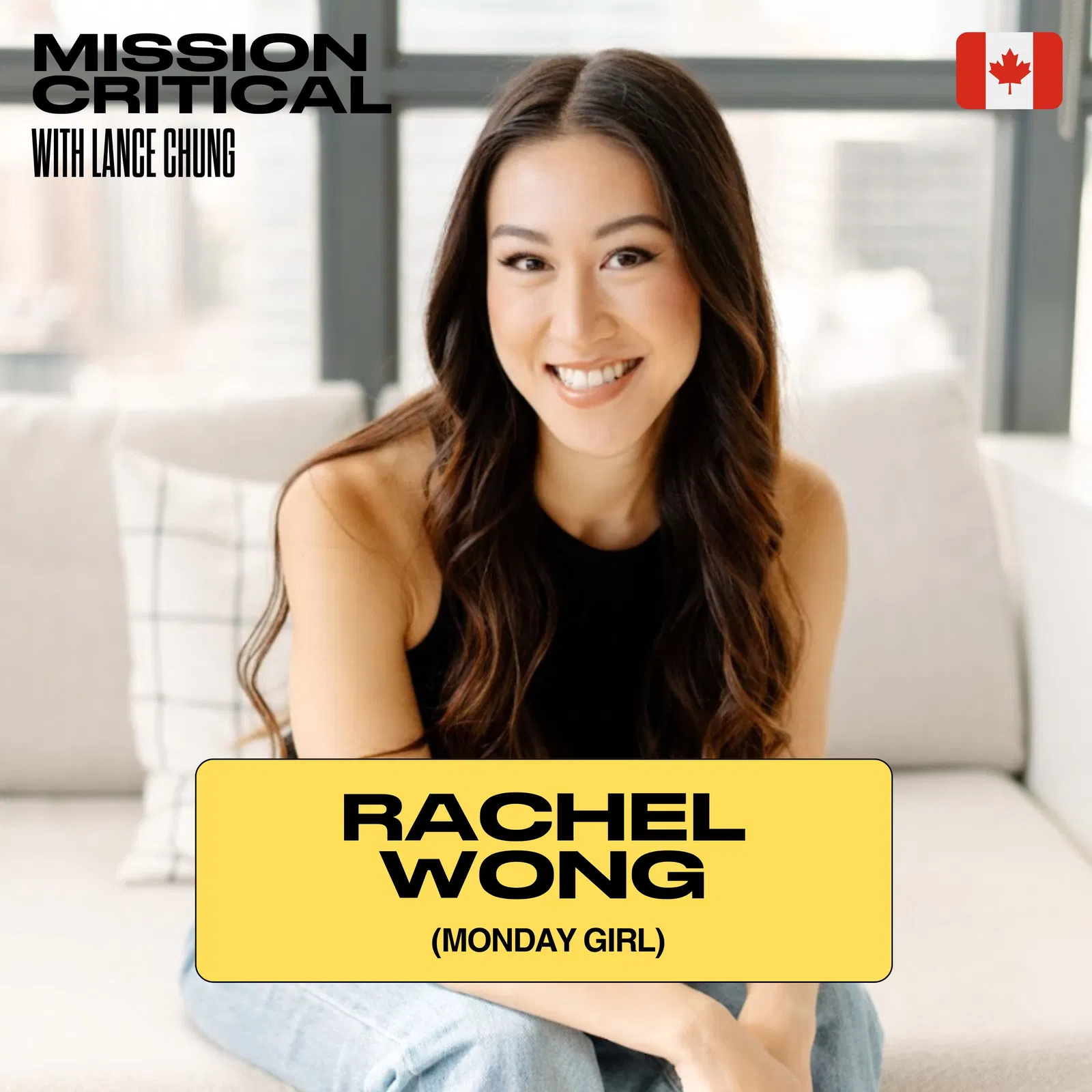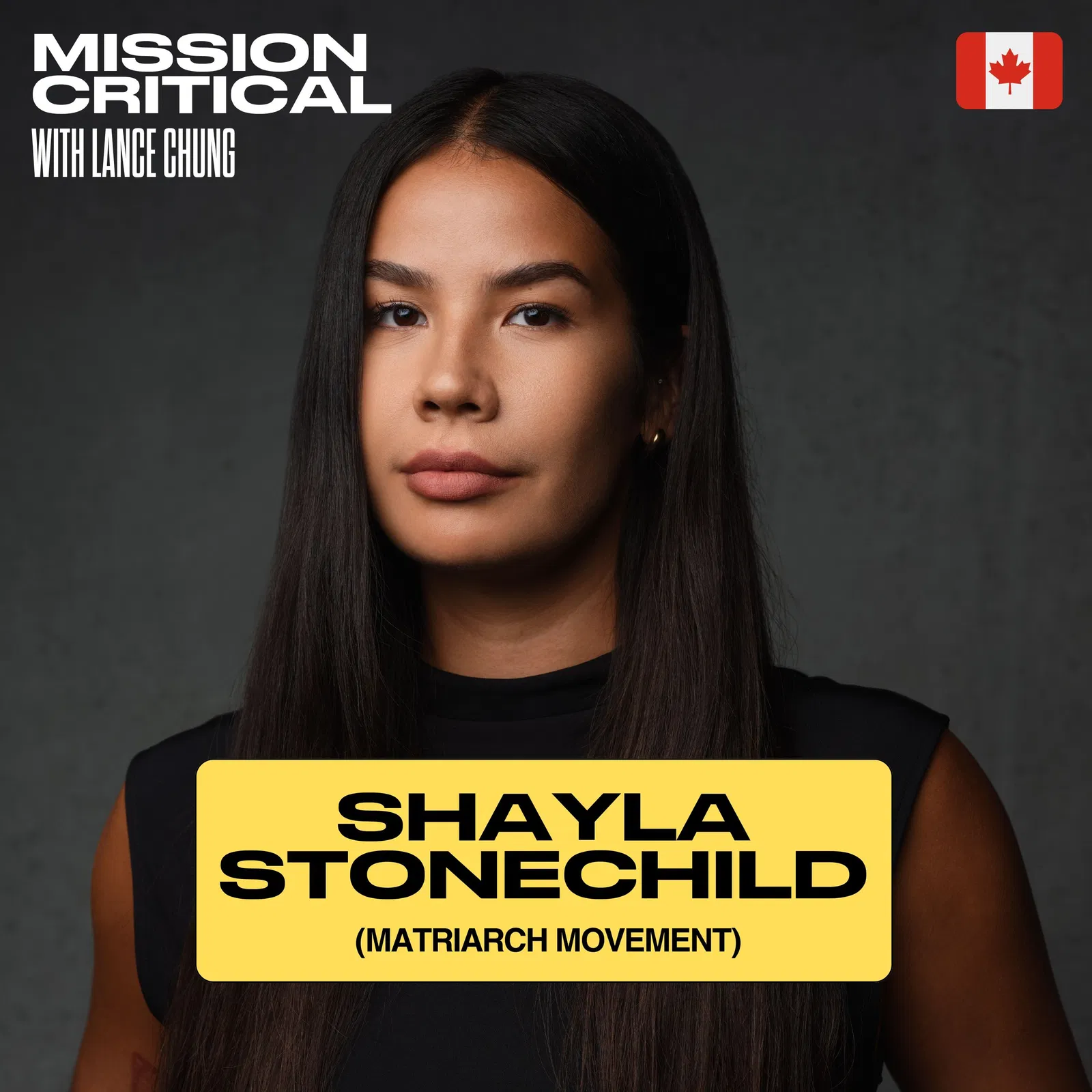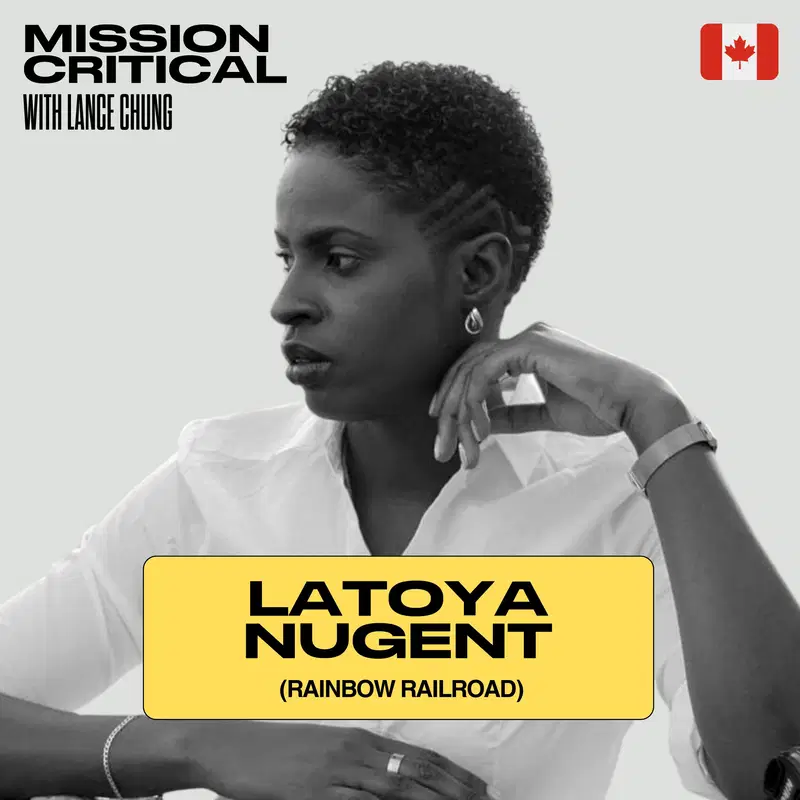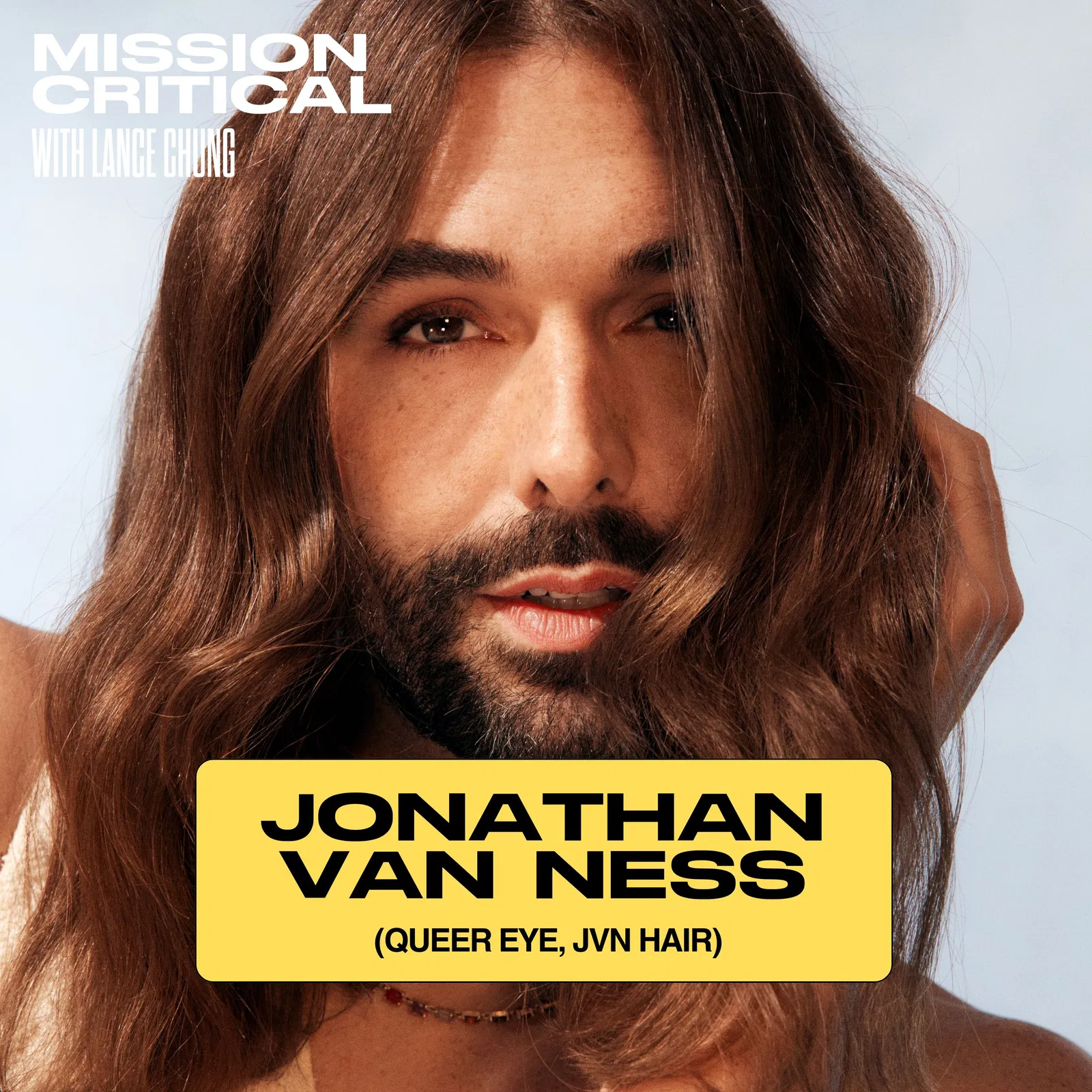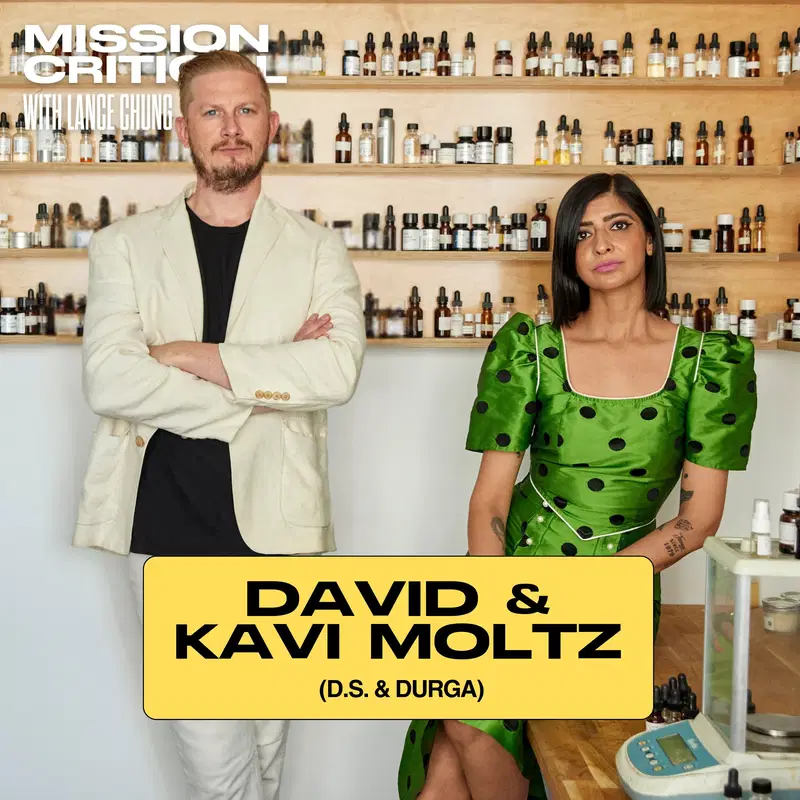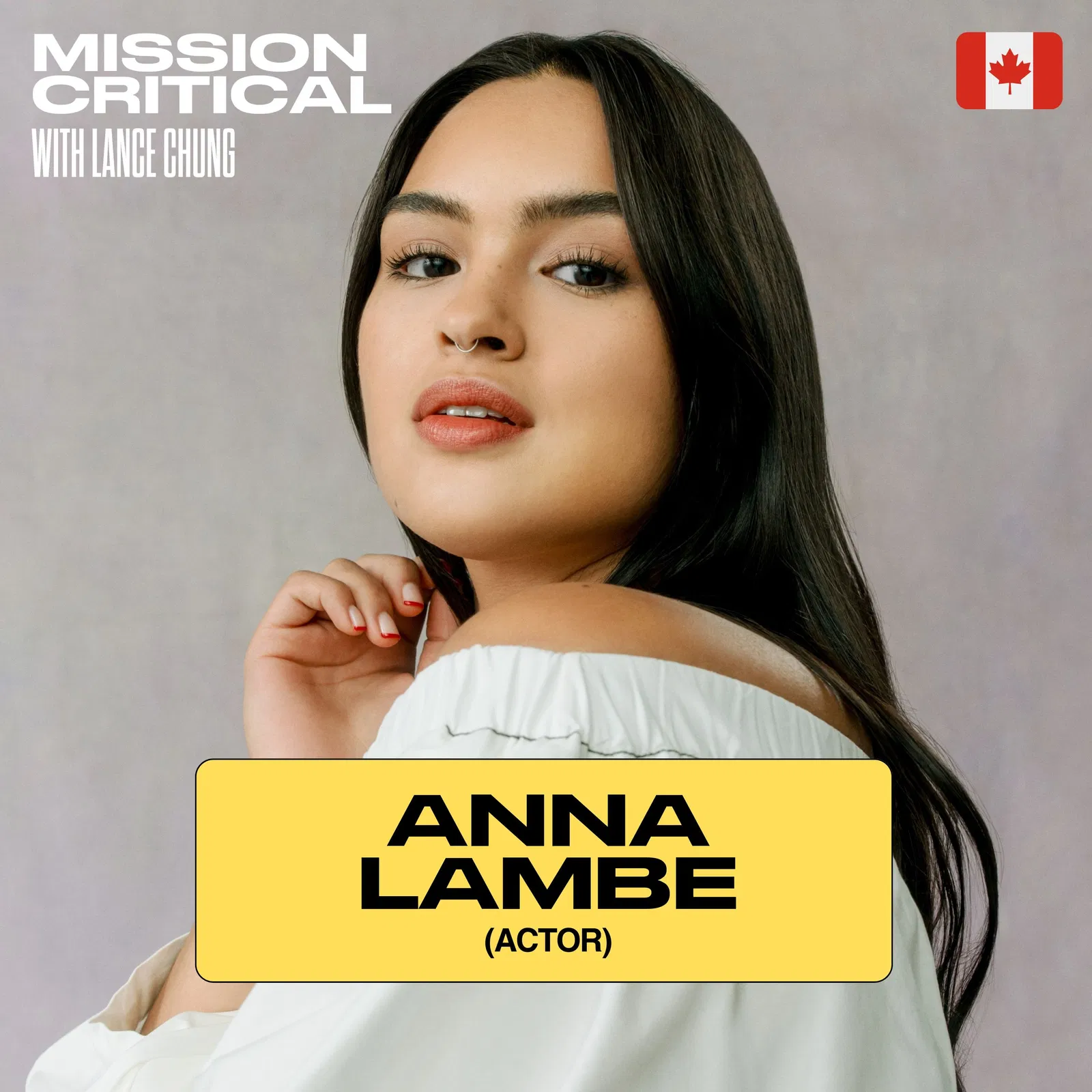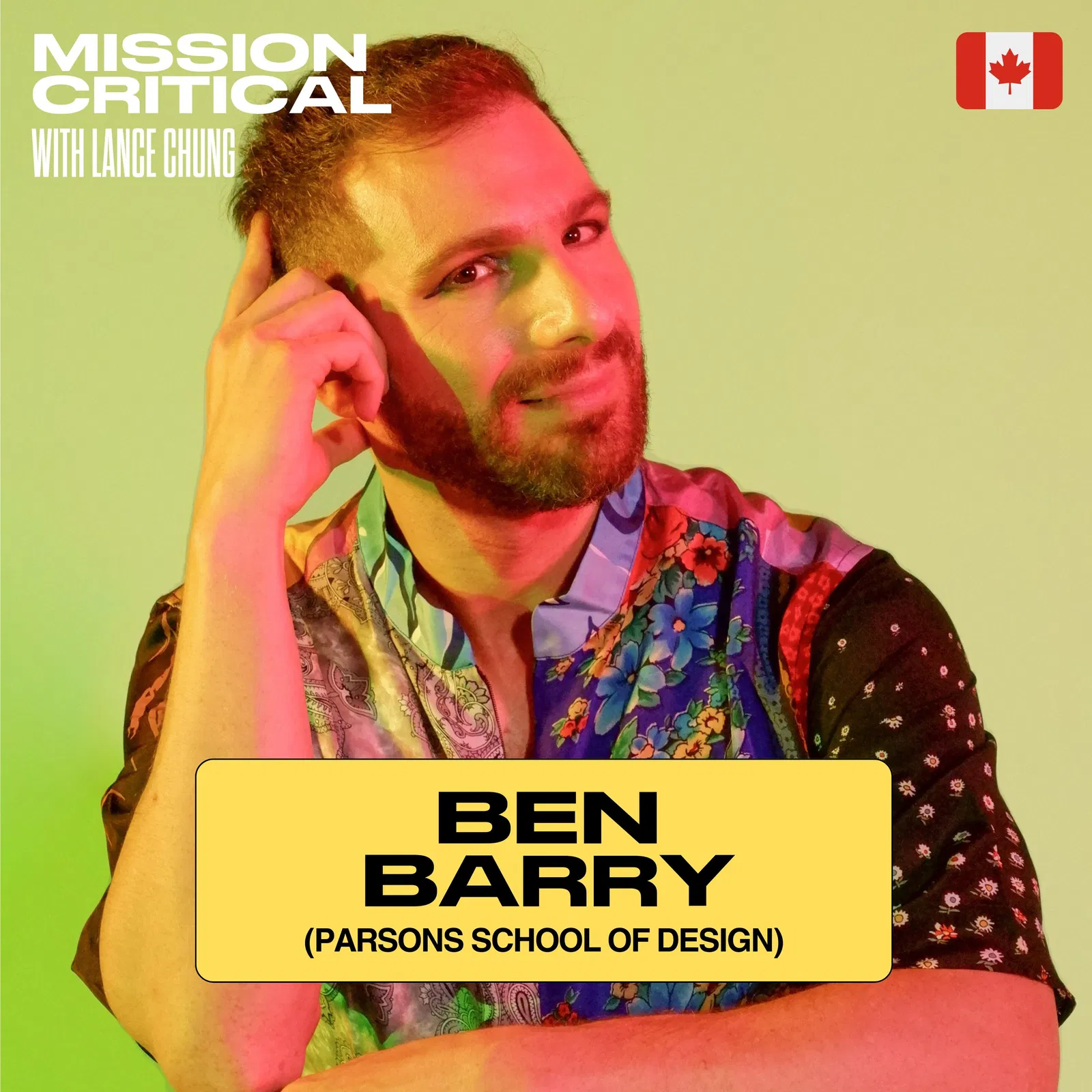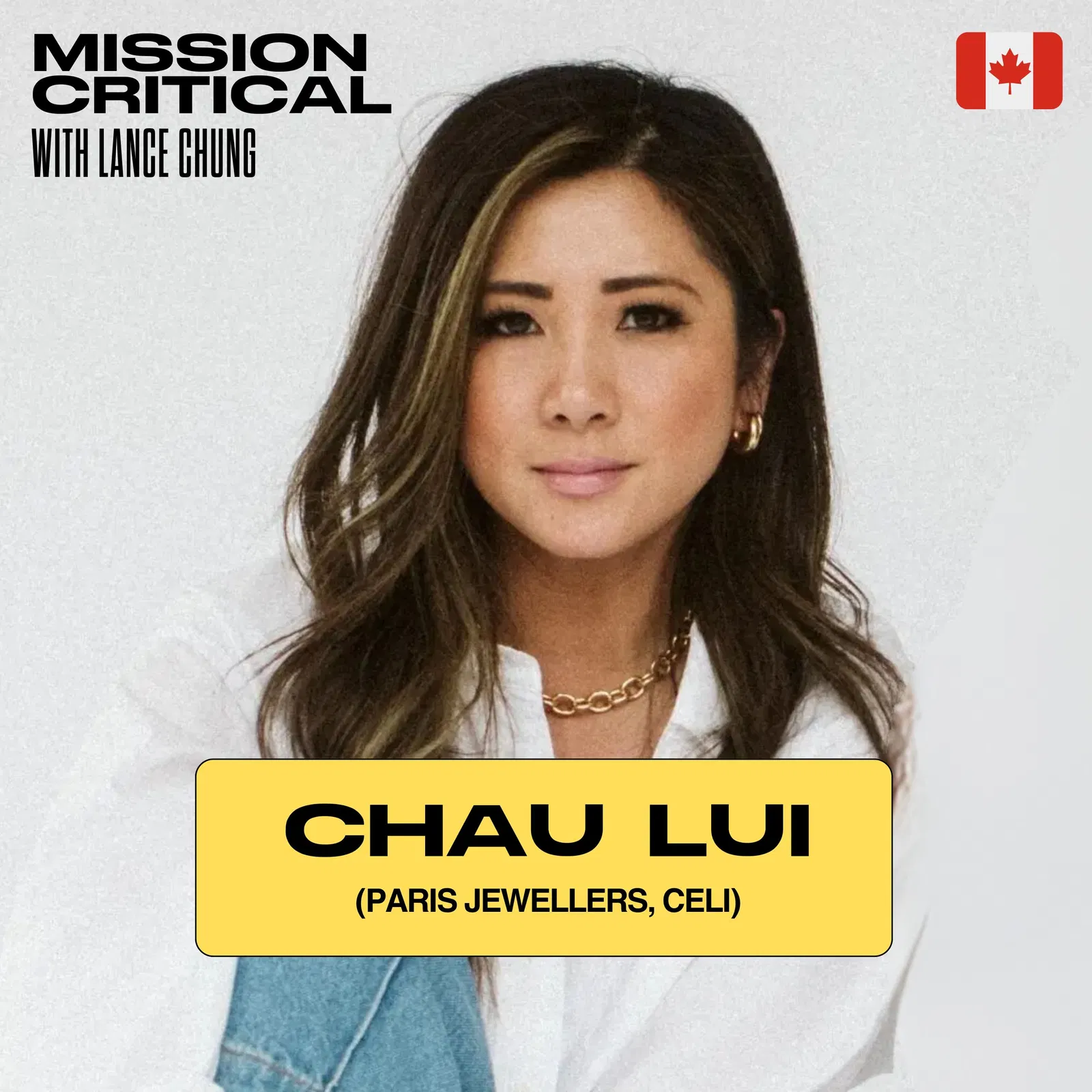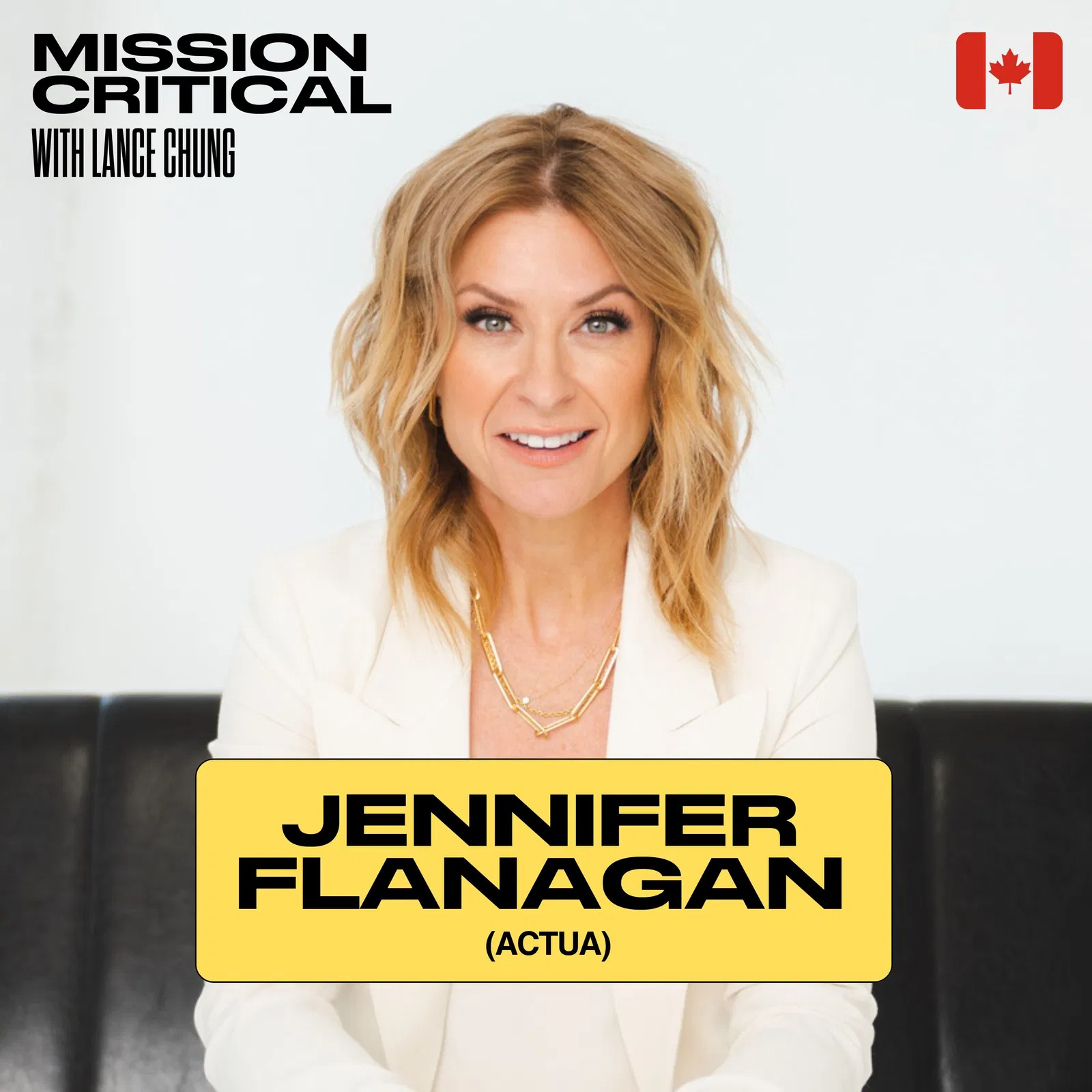Discover Mission Critical with Lance Chung
Mission Critical with Lance Chung

Mission Critical with Lance Chung
Author: GLORY Podcast Network
Subscribed: 7,407Played: 38,140Subscribe
Share
© Copyright 2021
Description
Behind every great company, every groundbreaking idea, and every game-changing innovation, there’s a leader on a mission. Welcome to Mission Critical with Lance Chung—the show where we break down the blueprints, the bold moves, and the battle-tested playbooks of today’s most impactful leaders. From CEOs and founders to artists, designers, and athletes, we’re talking to the visionaries who build, innovate, and lead.
116 Episodes
Reverse
Filmmaker Maggie Kang has captured the world’s imagination with Kpop Demon Hunters, the animated blockbuster that’s topped Netflix’s most-watched list and redefined what global audiences expect from K-pop storytelling. Blending the spectacle of superhero cinema with the infectious energy of Korean pop culture, Kang’s film has inspired entirely new audiences and generations to a story that is universal in its themes.In this episode of Mission Critical, Maggie opens up about her journey from growing up without many Korean friends to becoming one of the most powerful voices shaping Asian representation in Hollywood. She shares what it means to break generational cycles, embrace cultural inheritance, and build worlds where young women can own their power — flaws and all.Together, Lance and Maggie talk about the universality of K-pop, how the film’s soundtrack became a cultural phenomenon, and what the future of Korean storytelling looks like in a world where “niche” no longer applies.Key TakeawaysHow Kpop Demon Hunters broke barriers in representation and global storytelling.The creative risks behind blending K-pop and the superhero genre.Maggie’s reflections on intergenerational identity, cultural inheritance, and belonging.Why authenticity (not translation) is the future of cultural storytelling.The lessons she’s taking forward into her next projects.HighlightsThe story behind Kpop Demon Hunters and who it was really made for.Why the characters’ flaws were essential to their power.The influence of her father’s filmmaking legacy.The future of Asian and diaspora narratives in mainstream media.Did you enjoy this episode? Make sure to like, subscribe, and leave a rating.
From scaling a billion-dollar tech company to trekking through the Amazon rainforest with Dr. Jane Goodall, Dax Dasilva has learned that growth only happens when you step outside your comfort zone. In this episode of Mission Critical, the Lightspeed CEO and Age of Union founder opens up about leadership, purpose, and risk—sharing lessons from both the boardroom and the jungle. We talk about how small businesses shape culture, why he believes entrepreneurship and activism are connected, and how his new book Echoes from Eden challenges us to reimagine what impact really means.Key Takeaways:Why leaving your comfort zone is essential to personal and professional growth.How Lightspeed empowers small businesses and strengthens community ecosystems.The connection between entrepreneurship, activism, and environmental leadership.What Dax learned from two years on the ground with Age of Union conservation projects.How the lessons from the wild can make you a better leader, creator, and changemaker.Insights from his new book, Echoes from Eden, on finding purpose through action.Get Dax's new book, Echoes from Eden: A Daring Voyage to Protect Earth's Last Wild Places - https://www.indigo.ca/en-ca/echoes-from-eden-a-daring-voyage-to-protect-earths-last-wild-places/9781628605693.htmlDid you enjoy this episode? Give Mission Critical with Lance Chung a subscribe and rating, wherever you listen and watch your podcasts.
Hosted in partnership with Holt Renfrew, host Lance Chung sits down for a follow-up interview with Yung Wu—co-founder of the Coalition of Innovation Leaders Advancing Respect and former CEO of MaRS Discover District. In their discussion, the two catch up for a live recording of the Mission Critical podcast to chat about leadership style, artificial intelligence, advice on how to navigate a volatile business landscape, and harnessing opportunity in the innovation economy.
In recent years, Toronto has made bold moves that signal its evolution into a true global sports capital — from the launch of the PWHL and AFC Toronto, to the announcement of a WNBA expansion team and the NHL’s renewed focus on international competition through the Four Nations Face-Off. And in the next two years, that momentum will reach a new peak as the city prepares to host World Cup matches in 2026 — arguably the most significant international sporting event in our city and Canada’s history.Recorded live at the 2025 GLORY Sports Summit (powered by GE Appliances) in Toronto, this conversation brings together leaders building Toronto’s sports future from every angle: major league expansion, global partnerships, grassroots development, and equity-driven advocacy. Teresa Resch (Toronto Tempo), Kyle McMann (NHL), Saroya Tinker (PWHL), and Diana Matheson (Northern Super League) joined moderator Alyson Walker (Wasserman) on stage to explore what it means to turn a city into a global sports hub — not just by hosting the world, but by ensuring that storytelling, access, investment, and community are at the heart of its growth.This is about how Toronto can create a legacy that lasts well beyond the final whistle.
From grassroots leagues to the global pitch, Canadian soccer has come a long way—but the journey is far from over. As Toronto prepares to become a host city for the 2026 FIFA World Cup, the spotlight is not only on the players but on the systems, the people, and the communities that have shaped the game here at home.Recorded live at the 2025 GLORY Sports Summit (powered by GE Appliances) in Toronto, this episode of The GLORY Sports Podcast features soccer legend Dwayne De Rosario, FIFA World Cup 2026 executive director Sharon Bollenbach, and First Touch Football CEO Marcus Hanson.Moderated by The Gist's Ellen Hyslop, this discussion explores the evolution of soccer in Canada, the unique challenges and opportunities facing the sport, and what it will take to ensure that the momentum doesn’t end when the final whistle blows.The big question? How do we turn this moment into a legacy that lasts?
Diana Matheson is one of the most decorated athletes in Canadian soccer history — an Olympian, a World Cup veteran, and the player responsible for one of the most iconic moments in Canadian sport: that 92nd-minute goal at London 2012 that secured Canada’s first medal in a traditional team sport in over 70 years.But what might be even more historic is what she’s doing now. As the co-founder of Project 8 and the visionary behind the newly announced Northern Super League, Diana is quite literally building the future of women’s professional soccer in Canada from the ground up.Alongside her is Anastasia Bucsis — an Olympian in long track speed skating and one of the most respected voices in Canadian sports media today. You’ve seen her on CBC Sports, heard her on Player’s Own Voice, and felt her impact far beyond the broadcast booth.But her influence goes deeper than sport. In the lead-up to the 2014 Sochi Olympics, Anastasia came out publicly in opposition to Russia’s anti-LGBTQ+ laws — becoming the only out athlete from North America to compete at those Games. It was a bold, deeply personal act of protest that continues to ripple across sport and society to this day.Together, they’ve carved out a life that is both deeply public and intentional, advocating for inclusion, pushing the boundaries of what’s possible in Canadian sport, and supporting one another every step of the way.Recorded live at the 2025 GLORY Sports Summit (powered by GE Appliances) in Toronto.
Recorded live at the 2025 GLORY Sports Summit (powered by GE Appliances) in Toronto, this specia episode features Jesse Marsch, Head Coach of the Canadian Men’s National Soccer Team.In less than a year, Toronto will serve as one of the key host cities for the 2026 FIFA World Cup, welcoming fans and teams from around the globe. Sure, this opportunity is about roaring stadiums and matchdays. But it’s also about building a lasting legacy of excellence, representation, and pride in Canadian soccer.On this episode, Marsch shares how Canada Soccer is preparing for this pivotal moment — from building a competitive national team to activating major partnerships that connect with communities coast to coast. Joined by CBC Sports host Andi Petrillo and Bob Park (GE Appliances), the panel explores building a winning culture, connecting with fans across the country, and creating a lasting legacy for Canadian soccer.
What happens when you blend Indigenous values, entrepreneurial grit, and a mission to do business differently? You get Cheekbone Beauty, one of Canada’s most purpose-driven beauty brands—and the brainchild of Jenn Harper.In this live episode of Mission Critical recorded in Toronto at Waterworks Food Hall, Lance sits down with Jenn to unpack her incredible journey—from overcoming addiction and selling fish (quite literally) to discovering her purpose in a dream and pioneering what she calls Indigenous Beauty, a category rooted in authentic sustainability.Jenn gets candid about the highs and lows of building a brand from scratch, how close she came to shutting down, and why community—especially her customers—has always been the foundation of her success.This episode is presented by Mastercard Canada as part of a special series spotlighting small business owners who are shaping the future of Canadian entrepreneurship.Listen now to hear how Jenn is rewriting the narrative—and what she wants the world to know about Indigenous excellence, sustainability, and the future of beauty.Key Highlights & Takeaways💄 Origin Story with Purpose: Cheekbone Beauty was born from a dream—and Jenn’s mission to give back to her Indigenous community and rewrite the narrative around Indigenous success.📚 Scholarship Fund Impact: With the support of partners like Mastercard, Cheekbone Beauty launched a scholarship fund that has awarded 30+ scholarships to Indigenous youth since 2021.🌱 Indigenous Beauty as a Category: Jenn is working to define Indigenous Beauty as a global category—anchored in authentic sustainability, community values, and cultural leadership.🔥 Billion-Dollar Vision: She’s unapologetically building a brand with the goal of reaching a $1B valuation—and doing it with only six full-time staff and a lot of heart.🤝 The Power of Community: Jenn credits her survival in business to loyal customers and movements like Buy Canadian, proving that small business success is community-driven.💬 Leadership Through Love and Humility: Drawing from her Anishinaabe culture, Jenn built Cheekbone’s core values on love, humility, and integrity—redefining what business leadership can look like.🎤 Being Vulnerable Online: Jenn opens up about sharing her story publicly, navigating social media as a founder, and why transparency helps build stronger customer relationships.
What does it take to thrive as both a designer and an entrepreneur? In this episode of Mission Critical, Lance sits down with Lesley Hampton—Indigenous artist, acclaimed fashion designer, and founder of her namesake brand—for a conversation about creativity, community, and self-preservation.From dressing icons like Lizzo, Lily Gladstone, and Sandra Oh, to challenging colonial norms in fashion, Lesley has carved out a space that’s inclusive and deeply intentional. But behind the red carpet moments is a commitment to mental health and setting boundaries. As Lesley puts it, “My business isn’t thriving unless I’m thriving.”Presented by Mastercard Canada, this episode is part of a series celebrating Canadian small business owners and the stories behind the brands. We talk about the power of mentorship, what it means to lead with your values, and why asking for help (even through a DM) can change the trajectory of your career.Listen now to learn how Lesley built her brand from scratch, why fashion can be a form of activism, and how she’s creating space for the next generation of Indigenous talent.
This episode is presented in partnership with Mastercard Canada. Listen now and join the Mastercard Small Business Community—a network built to help entrepreneurs learn, grow, and connect. Sign up at mastercard.ca/smallbusiness.What if a beverage could change how we gather, how we connect, and how we feel seen?In this episode of Mission Critical, Lance sits down with Andrea Grand, co-founder of Barbet, the stylish and intentional Canadian non-alcoholic beverage brand that's become a mainstay on menus and in fridges across the country. But beyond the buzz and the branding is a story rooted in personal experience, cultural disruption, and purpose-driven entrepreneurship.Andrea shares how her sister’s health journey was the catalyst behind Barbet’s creation, and how they set out to challenge the norms of an alcohol-centric beverage industry. From battling the assumption that non-alcoholic drinks are “less than” to creating a beverage that fits into social moments without compromising experience, Andrea built Barbet to be, yes, a great drink. But also, a brand with a point of view. A design-forward invitation to inclusivity and a challenger to industry conventions.In this episode, Andrea reflects on:The emotional rollercoaster of building a brand from scratch—without a roadmapWhy perfection is a myth, and launching before you're ready might be the best move you can makeThe importance of support systems (financial and emotional) in surviving entrepreneurshipHow small businesses are not just economic contributors, but cultural catalystsWhat modern leadership looks like when you’re building in public, balancing vulnerability with visionWhy visibility and community are essential to long-term impact, especially for women-led brandsThroughout the conversation, Andrea underscores that Barbet isn’t a sobriety brand, but rather an inclusive lifestyle brand for anyone looking to drink differently, without compromising taste, aesthetic, or ritual.
This episode is presented in partnership with Mastercard Canada. Listen now and join the Mastercard Small Business Community—a network built to help entrepreneurs learn, grow, and connect. Sign up at mastercard.ca/smallbusiness.What if networking wasn’t transactional, intimidating, or exclusive—but reimagined as a safe, empowering, and welcoming experience for ambitious women? That’s the mission behind Monday Girl, a community-driven platform co-founded by Rachel Wong that’s reshaping how the next generation of women professionals connect, grow, and succeed.In this episode of Mission Critical, Lance sits down with Rachel to explore the personal story and social experiment that launched Monday Girl, the challenges of unlearning outdated rules in entrepreneurship, and the powerful role of community in business. From bootstrapping the business as a side hustle to scaling a membership of over 350,000 across North America, Rachel offers candid reflections on vulnerability, imposter syndrome, and what real support for women founders looks like in today’s ecosystem.Whether you’re building your own business or searching for your people, Rachel’s insights on building with heart, purpose, and momentum will leave you inspired to take your next bold step.Key Takeaways:The gendered dynamics of networking and how Monday Girl is rewriting the script.Why Rachel believes you should “hate your first version”—and keep building anyway.The power of community as a product—and why vulnerability can be a superpower.How the idea of success is shifting from unicorns and venture capital to slow, sustainable growth.The underestimated importance of peer mentorship and seeing role models who reflect your story.
What does it mean to reclaim space in a world that was never built with you in mind? And how do you transform platforms designed for performance into spaces for healing, community, and cultural resurgence?In this episode of Mission Critical, Lance sits down with Shayla Stonechild, a powerful voice in the movement to uplift Indigenous stories, wisdom, and wellness. As the founder of the Matriarch Movement and host of its podcast, Shayla is redefining what it means to be an Indigenous influencer in today’s digital world. Her work lives at the intersection of spirituality, activism, and storytelling—and she’s using platforms like Instagram and podcasting not for virality, but for impact.The two talk about the responsibility that comes with sharing stories online, how Indigenous storytelling is rooted in relationship and land, and why healing (especially for Indigenous women and Two-Spirit people) is a radical act of resistance. Shayla also shares her hopes for the future, including two newly announced book deals and her vision for Indigenous voices to be centered in the global wellness industry.Key Takeaways:How Indigenous storytelling is evolving through social media and podcasting.The protocols and responsibilities tied to sharing stories from your culture and lineage.What decolonized leadership looks like through a matriarchal, relational lens.Why healing and wellness for Indigenous people is deeply political.How Shayla is using digital spaces to amplify voices that have long been silenced.
Pride is more than a celebration—it’s a call to action. And in a world where LGBTQ+ lives are still under threat, that call has never been more urgent.In this powerful episode, Lance sits down with Latoya Nugent, Head of Engagement at Rainbow Railroad, an international organization helping LGBTQI+ individuals escape state-sponsored violence and persecution. Latoya speaks not only as a leader, but as a survivor—she was forced to flee Jamaica after being targeted for her identity, and found safety in Canada through Rainbow Railroad’s life-saving work.Now, she’s building programs that center refugee leadership, amplify queer voices, and push for global systems change. We discuss how displacement shaped her path, why Pride must remain political, and what it means to fight for your rights when the system is not built to protect you. Key Takeaways:The roots of Pride in protest, resistance, and political organizing.Why queer and trans refugees face unique dangers worldwide.How Rainbow Railroad helps LGBTQ+ individuals escape persecution and find safety.Latoya's personal story of forced displacement and transformation into a leader.Common myths and harmful narratives about refugees—and how to dismantle them.The failures of resettlement systems to protect queer lives.The role of refugee-led leadership and the power of lived experience.How to build true global solidarity with queer and trans communities at risk.What allyship actually looks like beyond social media support.Why Pride must remain a force for radical, collective liberation.Links:Rainbow Railroad: https://www.rainbowrailroad.org/Donate Now: https://www.rainbowrailroad.org/donate
Happy Pride Month, everyone.Pride is many things—celebration, visibility, love—but it’s also resistance. It began as a protest, led by queer and trans people who demanded to be seen, safe, and free. And while we celebrate today, that original spirit feels more urgent than ever. Across the world, queer and trans communities are facing renewed backlash—their rights questioned, their bodies debated, their joy politicized.And yet, joy persists.In today’s episode, Lance is joined by someone who embodies that very dynamic—and that resilience. Joining him, and making a return to the Mission Critical podcast, is Jonathan Van Ness—a voice many know for their humour, beauty, and boldness. Over the past year, Jonathan has navigated intense public attention, scrutiny, and personal transformation. But what’s equally true is that it was also a year of tremendous support and success: their podcast Getting Better grew, their book became a New York Times bestseller, and Queer Eye continues to thrive. Despite the challenges that 2024 brought, they chose to reawaken, to return to joy—not as escape, but as power.This conversation is about what it means to lead with joy—especially when the world insists on something else. It's about resistance, intention, recalibration and building something lasting from the most authentic parts of who you are.This is Mission Critical. Let's get into it.Key Takeaways & Highlights:Why joy, for queer people, is both survival and strategy.The business decisions and emotional clarity that helped Jonathan rebuild in 2024.What it means to build a media and beauty empire rooted in queer identity.Honest reflections on public scrutiny.The role of activism in brand-building—and when to say no.How Jonathan defines success, leadership, and purpose after a year of transformation.
In this episode of Mission Critical, Lance catches up with David and Kavi Moltz, the husband-and-wife duo behind the cult fragrance brand D.S. & DURGA. You might recognize their minimalist, design-forward bottles on the shelves of your favorite department store—clean fonts, matte black caps, and labels that evoke poetry, punk, and place in equal measure.But what you won’t see on the shelf is the wild, unconventional journey behind the brand: starting from scratch in a Brooklyn apartment, hand-labeling bottles, learning perfumery without formal training, and scaling their business with zero investors for the first decade.David and Kavi share how they built one of the most distinctive indie fragrance brands in the world—not by chasing trends, but by trusting their instincts, telling great stories, and growing slowly and intentionally.Key Takeaways:Why creative integrity is a long game—and why it's worth it.Lessons in DIY brand-building without a business plan.How to stay independent while navigating growth and investment.Why "brand" and "business" don’t have to kill artistry.The value of trusting your weird ideas—and turning them into product.
Today’s guest knows what it means to disrupt the status quo. Carinne Chambers-Saini is the co-founder and CEO of Diva, the Canadian company that put menstrual cups on the map long before the fem-care space was even a thing—they created an entire business category. While most brands steered clear of the stigma around menstruation, Carinne leaned in, using her platform to advocate for body autonomy, women’s health, and sustainable solutions—way before it was fashionable to do so. Now, more than two decades later, Carinne is still challenging the status quo. With Diva’s latest product line expanding into vulvar health, she’s bringing the same relentless focus on science, accessibility, and cultural change to a category that remains under-discussed, underfunded, and censored. And she’s doing it in a time when women’s bodies have become political battlegrounds—where words like “vulva” and “menopause” are still treated as provocative, even as access to basic healthcare is being rolled back.Today, Lance and Carinne dive into what it takes to lead in a category you had to invent from scratch, the exhausting work of advocating for research and respect in women’s health, and what happens when business collides with a culture that still thinks your body is a political statement. Key Highlights & Takeaways:Inventing a Category: How Carinne and her mother built Diva from the ground up, created a new market, and challenged industry norms with conviction and grit.The Politics of Women’s Bodies: A candid conversation about the ongoing weaponization of healthcare, the lack of research in women’s health, and how companies can—and must—show up as advocates.Breaking the “Ick” Factor: Educating not just consumers, but also medical professionals, buyers, and gatekeepers in a system still uncomfortable with women’s anatomy.A New Chapter in Vulvar Wellness: Why Diva’s expansion into vulvar care is timely, necessary, and rooted in the brand’s legacy of clean, effective, science-backed solutions.Menstrual Leave as Culture Shift: How Diva walks its talk internally, offering paid menstrual and menopause leave to create space for real well-being.Redefining What’s ‘Normal’: The importance of tracking, quantifying, and understanding the menstrual experience as a way to validate women’s pain and experiences—especially in diagnosing conditions like endometriosis.Legacy & Leadership: Carinne’s reflections on leading with values, staying true to the mission, and the responsibility that comes with being a pioneer.
What does it mean to be a ‘modern Inuk woman’—and who gets to define that? That’s one of the many bold questions North of North poses. It’s the first large-scale TV series shot in Nunavut, co-produced by CBC and Netflix, and presented by APTN, with over 500 locals cast as background actors and a $23 million impact on the Canadian economy. But beyond the numbers, it’s a groundbreaking show that shatters stereotypes about the North, showcasing Inuit life as vibrant, joyful, and deeply layered.At the center of it all is Anna Lambe—an actor, advocate, and rising star who’s just getting started. From challenging the white saviour narrative to celebrating the complexities of being a young Inuk woman, Anna brings humour, heart, and unapologetic authenticity to the screen. And with a new project alongside Brad Pitt on the horizon, her influence is only growing.Today, Anna joins Lance to talk about the power of storytelling, the radical act of centering joy in Indigenous narratives, and why North of North is more than just a TV show—it’s a cultural moment. This is Mission Critical. Let’s get into it.Key Highlights and Takeaways:Redefining Inuit Identity: Anna discusses what it means to be a “modern Inuk woman” and how North of North pushes back against outdated narratives about the Arctic and its people.Joy as Resistance: Why centering Indigenous joy is a radical act — and how the series uses humor and warmth to tell complex stories.Cultural Fashion as Storytelling: The intentional use of Inuit fashion, from vibrant parkas to traditional fur, and how it connects to both personal identity and cultural survival.Economic and Cultural Impact: The show’s $23M impact on the Canadian economy and the 500+ local roles created in Iqaluit — a game-changing moment for Nunavut’s film industry.White Saviour Complex: Anna unpacks how the character of Helen embodies the complexities of well-intentioned “helpers” in Indigenous communities, and why the show avoids easy answers.Global Reach and Representation: With Netflix as a distribution partner, North of North is bringing Inuit stories to a global audience — and changing the narrative about what Indigenous storytelling can look like.
The Met Gala is fashion’s grandest stage — a place where style, celebrity, and cultural commentary collide in a single, glittering red carpet. But even amid the extravagance and fantasy, some things remain untouched. Why do so many men still cling to the sartorial safety net of conservative suiting and restraint? And what does it reveal about the ways we continue to police masculinity, even in spaces supposedly built for self-expression?In this episode of Mission Critical, host Lance Chung sits down with Dr. Ben Barry, Dean of Fashion at Parsons School of Design and a leading advocate for inclusive, equity-driven fashion education. Together, they unpack how fashion operates as both a performance of power and a vehicle for cultural critique — whether it’s on the Met Gala steps, in political arenas, or in everyday life.From his groundbreaking work at Parsons to his research on how men navigate masculinity through clothing, Barry brings fresh insights into the complex intersection of style, identity, and power. In a world where what we wear can both liberate and confine, Barry challenges us to rethink what masculinity looks like — and who gets to define it.Key Takeaways and Highlights:Masculinity as a Performance: How men strategically use clothing to “shore up” masculinity, adapting their style to conform or disrupt depending on context — whether it’s the Met Gala red carpet or a corporate boardroom.The Politics of Power Dressing: The connection between style and authority in politics, from Obama’s infamous tan suit to Zelenskyy’s military green tee to Donald Trump's red tie — and why men who stray from traditional masculine dress codes often face backlash.Cripping Masculinity: Barry’s research on how disabled, fat, and queer men challenge conventional masculinity through clothing, reframing garments as tools for resistance and self-expression.Expanding Fashion’s Reach: The Parsons Disabled Fashion Student Program and how Barry is redefining fashion education to prioritize access, equity, and radical visibility for marginalized bodies.Soft Masculinity vs. Strategic Dressing: The rise of “soft boy” aesthetics — nail polish, pearls, florals — and how fashion is both embracing and co-opting traditionally feminine codes as a new form of hegemonic masculinity.Fashion as a Tool for Liberation: How fashion can function as a site of cultural resistance, allowing marginalized bodies to reclaim space and assert visibility against a backdrop of systemic erasure.
As the co-owner of Paris Jewellers Canada, a family-run business started by her Vietnamese immigrant parents in 1987, Chau Lui has turned heritage into a mission. With over 23 stores across the country, the brand is known not just for its sparkle, but for its story—a story that began with her mother, who didn’t speak English, relying on a Vietnamese-to-English dictionary to serve her first customers. Today, that same dictionary—a symbol of perseverance, identity, and the quiet strength behind every success story—is on display in the flagship showroom of her latest brand, CELI.CELI is a modern fine jewelry brand that marks the next chapter in her journey—rooted in heritage, elevated in design, and deeply personal. Where Paris Jewellers reflects her family’s immigrant beginnings, CELI represents a bold step forward: a brand built from the ground up by two sisters who have turned lived experience into lasting impact. It’s a reflection of Chau’s growth as a founder, her desire to create something lasting on her own terms, and her vision to shape the future of luxury through storytelling, cultural pride, and craftsmanship.In this episode, Lance and Chau talk about building a legacy from scratch, the emotional power of jewelry to connect generations, and her game-changing new partnership as the official ring designer for the Professional Women’s Hockey League’s first-ever championship rings.It’s a story of grit, grace, and generational impact—told through gold, gemstones, and an unwavering belief in the beauty of where you come from.
What happens when science itself becomes a battleground?In this Mission Critical live episode—recorded at Toronto’s Annex Hotel and presented in partnership with Veuve Clicquot—Lance sits down with Jennifer Flanagan, President and CEO of Actua, to unpack a critical question: What does it take to protect the future of science—and who gets to participate in building it?In an era marked by rising pseudoscience, political polarization, and the defunding of education, science is no longer seen as neutral ground. From misinformation about vaccines to the growing divide in who gets access to STEM education, the conversation around science has become urgent, complicated, and deeply human. Enter Jennifer Flanagan—a trailblazer who’s spent over 25 years on the front lines of youth engagement, tech equity, and national policy. As the most recent recipient of Veuve Clicquot’s Bold Woman Award, she’s part activist, part architect, and entirely devoted to changing who gets a seat at the lab bench.Key Takeaways & Highlights:The destabilization of science: How public trust in science is eroding—and what we can do about it.Pseudoscience and misinformation: Why STEM literacy is now a form of social armor.The urgency of youth empowerment: Jennifer explains why getting kids into STEM early—especially those from marginalized communities—isn’t just a good idea, it’s a national imperative.Equity in tech and education: Real-world strategies for making STEM more inclusive, and why Jennifer believes outreach isn’t enough—we need structural change.Building Actua: Behind the scenes of leading a national STEM organization that reaches over 400,000 young people annually.Links:Veuve Clicquot Bold Woman Awards Nomination: https://www.boldopendatabase.com/en/bold-woman-award




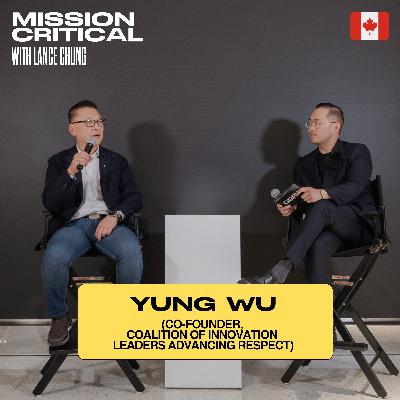
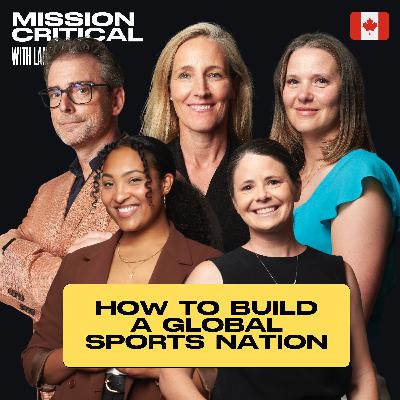

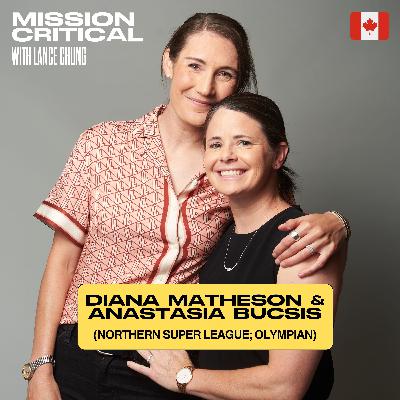
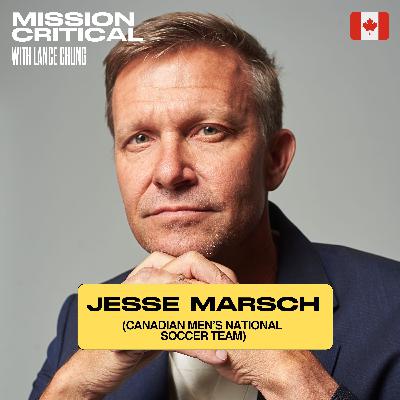
![Jenn Harper (Founder, Cheekbone Beauty): "Why CAN'T We Build a Billion-Dollar [Beauty] Brand?" Jenn Harper (Founder, Cheekbone Beauty): "Why CAN'T We Build a Billion-Dollar [Beauty] Brand?"](https://media.rss.com/mission-critical-with-lance-chung/cover_0ca538d95dacfaf42366c91d804dc1ec.jpg)
